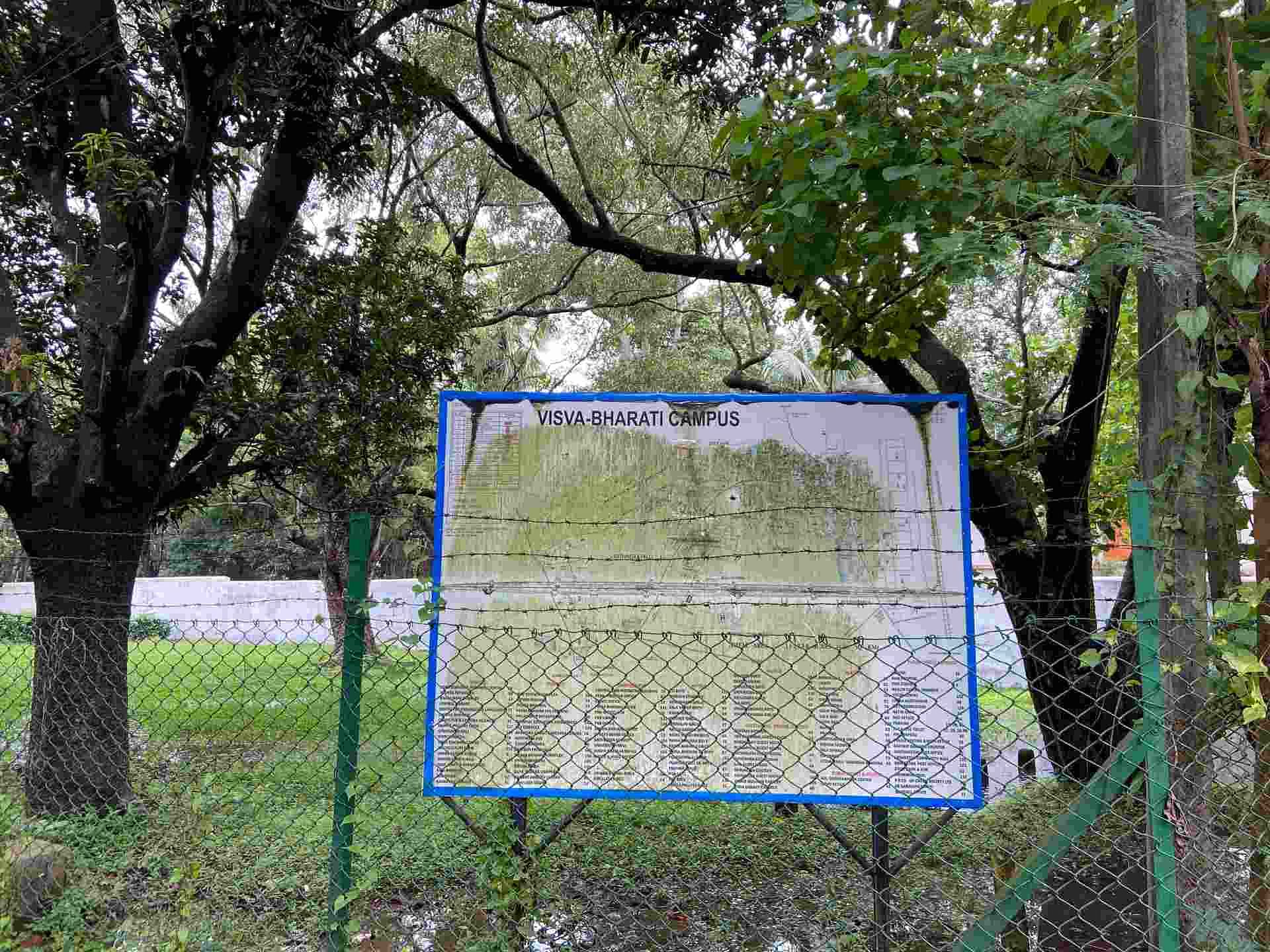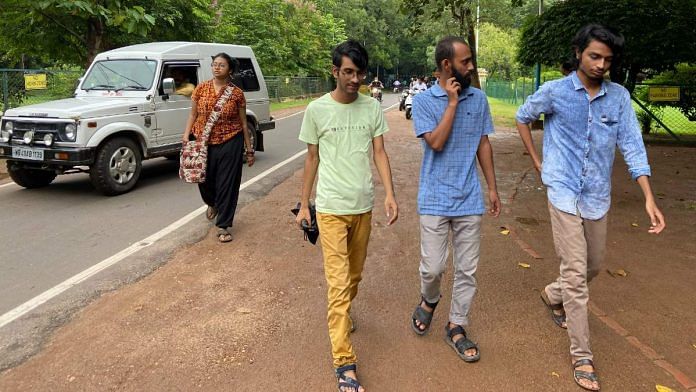Santiniketan (Bolpur): Alienated students, angry teachers, restive campus residents, traditionalists offended by the discontinuation of the historic Poush Mela as well as an organisation for women empowerment, and finally a stricture from the Calcutta High Court that sets aside the rustication of three students. Add to this, a decline in this year’s National Institute Ranking Framework (NIRF) to 64 from 50. Yet all that the Visva-Bharati Vice-Chancellor Bidyut Chakrabarty has to say is that he is not in a position to comment on the matter of expulsion.
In its centenary year, Visva-Bharati University, set up by Nobel laureate Rabindranath Tagore as a place for “creative activity” with scope for all kinds of “intellectual exploration”, has become a shadow of its once great self.
On 23 August, three students who protested against several issues — Phalguni Pan and Somnath Shaw of the economics department and Rupa Chakraborty of the Hindustani classical music department — were expelled by the vice-chancellor for three years for “besmirching the university’s administrative decisions and universal high reputation”. It led to student protests, gherao of the Vice-Chancellor, and a court case.
That’s not all.
Since January 2020, the university has served show cause notices and charge sheets on more than 150 professors for “indiscipline and misconduct”, according to the Visva-Bharati University Faculty Association. Eleven faculty members, including two heads of departments (HoD), and a dozen non-teaching staff have been suspended this year, while the salaries of three faculty members and two officers have allegedly been affected.
The Calcutta High Court, in setting aside the rustication, has said education should not be sacrificed at the altar of politics. Yet, the man at the centre of the controversies remains silent, choosing not to address the issue either at a press conference organised on 17 September, or to ThePrint, which sent him a series of questions by mail and tried to meet him at his office, to no avail.
Also Read: Tagore’s Visva-Bharati shuts down indefinitely after mob goes on rampage at Poush Mela ground
Show cause, suspension, expulsion
According to the report compiled by a five-member inhouse inquiry committee, the charges brought against the three students “stand proved”. It accuses the three students of “taking the lead roles in the incident of utter chaos and vandalism taking over the law in their hands”.
Following the expulsion order, which is unique and almost unprecedented for Tagore’s university, the students moved the Calcutta High Court, which set aside the rustication in an order dated 16 September, declaring: “This court finds that the three students could not have caused the mayhem at the university but for the support of influential outsiders. It is sad to note that the noble cause of education has been slaughtered at the altar of politics and a political slugfest. Educational institutions are being misused as breeding grounds by political parties,” said the HC order.
The Visva-Bharati University Faculty Association says retirement benefits have been stopped for a former acting vice-chancellor, former finance officer and former registrar, and the services of two teachers and three non-teaching staff have been terminated.
ThePrint spoke to many professors, who said that they have been “gagged” by the authorities and warned of “consequences” if they speak to the media.
The cases of suspension and termination are at several stages of judicial scrutiny with the professors seeking legal redressal. Calling the V-C “abusive and disastrous” in nature, Sudipto Bhattacharyya, senior professor of physics, says: “There is no atmosphere of teaching or learning in the campus. Everything is in flux. Anyone, teacher or student, who does not praise the V-C is either served with a show cause notice, suspended, charge-sheeted or fired. How can there be educational and cultural values if the environment is so vitiated?”
Bhattacharyya, who has been teaching in the university for two decades, is currently fighting his suspension order in the Calcutta High Court.
Bhattacharyya has been instrumental in fighting for the rusticated students. A day after the court set aside the rustication order, on 16 September, Bhattacharyya was served with another show cause notice for “instigating students for unlawful activities”. “We have written over two dozen letters to our chancellor, Prime Minister Narendra Modi on this, but have not got a response or redressal,” he adds.
The recent show cause notice to the professor came 24 hours after the Calcutta High Court in its order said, “The learned counsel appearing for the intervenor has submitted that at least 60-70 teachers, staff and professors have been suspended by the university. The said orders of suspension shall be reviewed in terms of the statute of the university, within a period of 15 days from date. It is expected that the university takes a very pragmatic view on the matter.”
The faculty members said they have no faith in the administrative system to take notice of the order.
“We do not feel there is any space for conducive discussion at the moment in the university,” says Manas Maity, senior professor of physics, who was removed from his position as HoD in March.
“We have not seen any effort on the part of the administration to reach out to the affected faculty members or staff. The image of the university is being tarnished daily,” he adds.
Reached for comment, Ashok Mahato, registrar of the university, refused to comment on the developments calling the cases “sub judice”.
Also Read: Day after Visva-Bharati violence, ED to probe source of money used for ‘mob mobilisation’
‘No room for discussion or debate’
Phalguni Pan, one of the rusticated students, says: “The suspension notices claim that we tried to vandalise the professor’s chamber. But there is no footage of that. We were protesting against several issues including the fee hike and random suspension of faculty members. The V-C did not give us any scope to put forward our side. After seven months of suspension, we were rusticated,” he says.
“I have grown up in Visva-Bharati, completed my school education here at Patha Bhavan. I have never seen such autocracy on Tagore’s campus,” he adds.
Sayoni Chakrabarty, a student of mass communication (Master’s), adds: “The student unrest is not restricted to a mere section as the authorities would like people to believe. Students of all departments are equally harassed and threatened.”
Meanwhile, suspensions, show cause notices and charge sheets continue unabated.
On 17 September, police registered an FIR on the basis of a complaint by a student against a professor, claiming that the latter abused him on the basis of his caste and ideology.
Dr Shantabhanu Sen, a Rabindra scholar and an alumnus, says the university has ceased to be what Tagore imagined. “There is no space for debate or deliberation. This is now a battlefield between two ideological groups — RSS-BJP, and the rest, which includes the communists,” he says.
Sen, brother of Nobel laureate Amartya Sen, says the V-C is acting like an RSS agent who wants to saffronise the entire university, though there is no clear evidence of it. What there is evidence of is that controversy has become second nature to Bidyut Chakrabarty. An alumnus of the London School of Economics, Chakrabarty’s last assignment was as professor of Delhi University. He joined Visva-Bharati as V-C in November 2018.
Several of his decisions have triggered unrest in and around the campus in the past two years. Starting with the boundary wall around the university premises, to stopping the Poush Mela (an annual handicraft fair started by Tagore for the villagers to sell handicrafts), to holding a seminar on the need for the Citizenship Amendment Act and the National Register of Citizens, to shutting down the Alapini Mahila Samity (an all-women alumni association started by Tagore’s niece in 1916 for social work) — Chakrabarty’s actions have been drawing severe criticism from several sections including faculty members, students, local residents and intellectuals.
Visva-Bharati is the only university in the country to have such a complex geographical location. The university is built over 1,130 acres of land that is spread over 80 square kilometres. The university has three tribal villages inside and several residential colonies.

It has innumerable entry and exit points. Tagore’s father bought the land in phases from local zamindars during the late nineteenth century. Tagore founded the Visva-Bharati in 1921, and it was recognised as a central university in 1951. The Prime Minister is the chancellor of the university.
The university found itself in a controversy in 2004, when Tagore’s Nobel Prize (medal and citation) was stolen from the university’s Uttarayan complex (museum). In 2008, a student was shot dead inside the girls’ hostel.
Since then, the authorities, in compliance with recommendations of several central committees, started fencing the area. However, work on the boundary wall has had to face protests from residents, as thousands of houses inside the university premises do not have an approach road or access without passing through university property. According to official records, of a total 35 km stretch, the authorities have completed fencing of around 30 km. But last year, massive violence broke out on the university premises over the construction, with a group of outsiders led by a local Trinamool MLA demolishing part of the fencing.
In July 2020, in a widely criticised move, Chakrabarty issued an order cancelling the 125-year-old Poush Mela permanently in the area. He said the university was “ill-equipped” to handle such an event, and called the festival “nightmarish”, as “the campus of Visva-Bharati is inaccessible to those who serve the university throughout the year”.
He also ordered the sealing of the Alapini Mahila Samity office. In December 2020, days before, the Visva-Bharati estate department wrote to the president and secretary of the Samity, asking them to vacate the office by the end of December 2020 on the ground that the university wanted it for academic activities, The Telegraph noted in a January report.
According to executive council member Arundhati Sengupta, the committee was set up by Indira Devi Chaudhurani to empower local women. Chaudhurani was appointed V-C of the university in 1946 and gave the Notun Bari, a thatched mud house, to the organisation in 1956.
“In January, we received a closure order from the V-C. We wanted to meet and discuss the issue with him, but he refused to do so. The senior members of our committee included Chitra Ghosh, niece of Netaji Subhas Bose. She was our vice-president and very attached to this committee. Ghosh died in January. The members are all alumni of the university, ex-teachers or professors or ex-V-Cs,” says Sengupta.
“We tried to submit our memorandum to the V-C. But he did not meet us then either, sending his peon instead. It seems that he is devoid of any basic courtesy. We have no idea why the office was closed,” says Sengupta.
On 13 September, adds Sengupta, the committee received another letter from the V-C’s office asking them to collect the office furniture within the next seven days. The members protested in front of the sealed office on 15 September.
Again to no avail.
This is an updated version of the report
Also Read: Visva-Bharati cancels 125-year-old annual Poush Mela, and it’s not because of Covid-19



